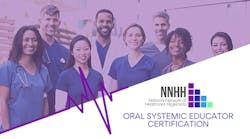Jamie Freitag-Dooley, RDH, BIS, CLBC
Kris Potts, BS, FAADH, RD
The National Network of Healthcare Hygienists (NNHH) Board of Directors are excited to announce that our very first certification, Oral Systemic Educator (OSE), is now available for registration. It is a self-paced, fully online, comprehensive review of each system of the body, including oral systemic implications, and the ramifications that medical providers should be aware of. The purpose is to help OSEs feel confident enough to deliver continuing education to collaborative care teams in their communities, provide on-site assessments, consultations, and referrals.
NNHH is a 501(c)(3) nonprofit organization dedicated to bridging the medical/dental divide by certifying registered dental hygienists in areas of medicine. Like registered nurses, we believe hygienists should be able to specialize as keeping up with the new data available in all areas of health care is nearly impossible. Our organization was established by Executive Director Jamie Dooley in 2018 after she attempted to integrate oral health into a large system and found the barriers bigger than anticipated. Our goal is that every collaborative care team in America includes an RDH by 2025. Membership grew slowly until the coronavirus pandemic hit, and then our numbers began to climb.
“Hygienists want options. They have the education, skills, and ability to formally integrate oral health into health-care systems, but because I have privately coached so many of them, I knew what was lacking was confidence. By offering a head-to-toe review of physiology and medical terminology, plus adding a robust "Integration Basics" Unit with topics such as leadership, and starting your oral health educator business, we are preparing new and seasoned RDHs to walk into any health-care system and position themselves as an expert.”—Jamie Freitag-Dooley, RDH, BIS, CLBC
While it’s only a drop in the bucket when it comes to full integration, it’s a big drop because relationships are important. We plan to elevate our certification holders as experts in their communities. Their names will be listed on our website with city and contact information, making it easy for large and small systems to find them. In addition, if they are members, they will have access to our network for shared resources, pilot program ideas, and coaching. Membership is not required to take the certification, but our members are being offered a large discount before we launch in January of 2021, when it will become available to everyone.
We spent 2019 looking into accreditation as a certifying organization, but discovered we needed a pilot certification program with pre- and post-knowledge data to even apply. It’s expensive. Our education director (who is also instructing oncology) had the answer:
“Let’s create a foundational certification that reviews the most common areas of medicine where we may see hygienists working to give them a taste, or sample. As they complete their capstone project implementing what they’ve learned in the area most intriguing to them, they will be ready for that area of medicine when it is offered as a full certification. This one will help them choose their specialty.”—Kris Potts, BS, FAADH, RD
We plan to use the proceeds from this certification to apply for accreditation, create pilot programs, and deep-dive specialty certifications, such as oncology and cardiology. We are also in communication with the American Academy of Oral Systemic Health and Bale & Doneen to recognize our certifications as part of their fellowship programs. They have been very receptive.
Between required capstone projects and optional six-week internships that offer Practicum Level Educator status, we expect our students to be making connections with health-care systems that will become formal opportunities. It’s possible one would have to start as a volunteer to get their foot in the door, but we know it won’t be long until paid options such as offering continuing education, consulting to set up systems and referrals programs, and resource creation begin to snowball.
Our list of instructors is impressive. We looked for experts in each area of medicine and hand-picked those with direct experience, enthusiasm, and insight to be part of our inaugural certification. As a huge bonus, we are offering CE for the over 30 hours of instruction. Since the units and modules are still in development right now, we cannot guarantee the number of CE, but it pushes the value of this to double the cost. We know it’s a scary time for our profession and that many are looking for alternatives to private practice, so we want to make this as accessible as possible.
We are not predicting how our graduates will use this certification. We are expecting our innovative thought leaders to create opportunities for themselves in many ways.
Since we are a national nonprofit, and each state has different laws, we are focusing on nonclinical ways we can have an impact on our nation’s oral systemic health; though some graduates may be able to incorporate clinical aspects due to their state's supervision laws.
An inspiring model is a pilot program created by Delta Dental of Arizona and Phoenix Children’s Hospital in 2019 to lower infection rates in the hematology/oncology departments. An RDH was chosen over four dentists for the grant-funded position. She has already been told that when the grant cycle is over, her position will be made permanent. She teaches providers, nurses, clinical staff, patients, and parents about dental issues involved with cancer treatment. She also performs rounds with clinical staff members, who consult with her in an effort to reduce the oral side effects of chemotherapy, such as xerostomia and oral lesions.
Medical systems don’t know how educated or passionate we are. We must show them. Once they see how we can add value and improve their outcomes, they will be looking for ways to carve out positions for us. We have created the title, what you do with it is up to you!
Learn more about the NNHH Oral Systemic Educator Certification at https://healthcarehygienists.org/ or by emailing their executive director at [email protected].






